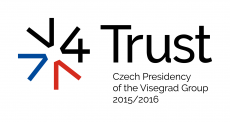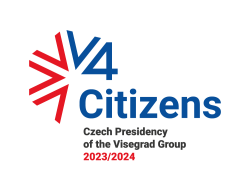
| Thu | Fri | Sat | Sun | Mon |
|---|---|---|---|---|
| 23 | 26 | 30 | 26 | 22 |
| Thu | Fri | Sat | Sun | Mon |
|---|---|---|---|---|
| 27 | 28 | 34 | 28 | 27 |
| Thu | Fri | Sat | Sun | Mon |
|---|---|---|---|---|
| 27 | 29 | 33 | 34 | 28 |
| Thu | Fri | Sat | Sun | Mon |
|---|---|---|---|---|
| 28 | 30 | 33 | 36 | 30 |
Joint Statement of the Heads of Government of the Visegrad Group Countries
Prague, September 4, 2015
We, the Prime Ministers of the Visegrad Group, meeting in Prague on 4 September 2015 on the occasion of an Extraordinary Visegrad Group Summit on migration adopt hereby the following Joint Statement:
 The countries of the Visegrad Group express profound sadness over the loss of lives of thousands of people in the context of the current migration situation in Europe. They underline that migration flows present a complex and serious challenge for the EU and its Member States. Hungary belongs among those most exposed to migratory pressures and affected by their impacts. The Prime Ministers of the CzechRepublic, Poland and the Slovak Republic therefore reiterate their full support to Hungary in tackling this challenge. As an expression of their solidarity, the Prime Ministers stand ready to provide Hungary with further assistance.
The countries of the Visegrad Group express profound sadness over the loss of lives of thousands of people in the context of the current migration situation in Europe. They underline that migration flows present a complex and serious challenge for the EU and its Member States. Hungary belongs among those most exposed to migratory pressures and affected by their impacts. The Prime Ministers of the CzechRepublic, Poland and the Slovak Republic therefore reiterate their full support to Hungary in tackling this challenge. As an expression of their solidarity, the Prime Ministers stand ready to provide Hungary with further assistance.
The countries of the Visegrad Group declare that they will continue to fulfil their obligations under the EU acquis, including the responsibility to protect the EU and Schengen Area external borders. The countries of the Visegrad Group stress that under the current circumstances of highest urgency the EU must focus on a constructive dialogue leading to effective common action and avoid any mutual accusations.
The countries of the Visegrad Group acknowledge that all Member States should contribute to finding adequate and effective long-lasting solutions as impacts of migration flows are felt across the whole Union with rising urgency. In the spirit of shared European values of humanism, solidarity and responsibility, the countries of the Visegrad Group have continuously taken an active part in defining and implementing many measures in response to the migration challenges.
The countries of the Visegrad Group have continuously pointed out that an effective management of the root causes of migration flows is the key element. The EU action plan stated in the June European Council conclusions provides an adequate basis in this respect. However, the progress so far on the ground has not been sufficient. The countries of the Visegrad Group therefore call for its rapid implementation. The countries of the Visegrad Group invite the European Commission to take stock of actions already undertaken at the extraordinary meeting of EU Ministers of Interior of 14 September and to present viable measures in order to effectively decrease and eventually cease the pull factors.
The countries of the Visegrad Group declare their full readiness to strengthen their engagement in this respect and to further contribute to the joint EU actions, namely by:
-
Enhancing bilateral assistance and aid schemes with particular focus on countries of transit and origin:
- aid to particularly vulnerable groups (e.g. orphans, injured, families with children);
- financial and material assistance to countries with significant refugee populations (Turkey, Jordan, Iraq/Kurdistan, Lebanon, including refugee camps, as well as the transit countries of the Western Balkans);
- support for increased cooperation with candidate and potential candidate countries in the context of accession negotiations;
- relevant project and programmes aimed at stabilisation.
- Providing experts and technical equipment for:
- EU external border protection (including Frontex and bilaterally to most exposed Member States);
- asylum procedure and relevant support actions (including EASO and hotspots);
- assistance to the border protection and migration management of the countries of the Western Balkans.
- Fully exploiting the potential of the foreign development cooperation in migration aspects; the Visegrad Group countries will examine the possibility of further increase of bilateral development assistance for countries of origin and transit for 2016/17.
- Increasing financial, technical and expert participation at the EU Common Security and Defence Policy mission against traffickers and smuggler networks.
- Intensifying prosecution and fight against traffickers and smugglers at the national level as well as further intensification of police and intelligence cooperation.
- Continuing the support to the international coalition fighting Da’esh in Iraq and Syria and providing various means of contribution (political, military and humanitarian) to the efforts of the coalition and to the stabilization of Iraq as tangible forms of tackling the root causes of the migration flows.
The countries of the Visegrad Group reiterate that the debate at the EU level on these elements should continue in a complex and balanced manner, based on the full implementation of the April and June European Council conclusions. The countries of the Visegrad Group call upon the European Commission to mobilize the relevant resources, to coordinate actively all relevant EU policies and instruments so that these can be fully used, strengthened, improved and aligned with national policies and instruments.
The countries of the Visegrad Group are convinced that the key elements of the EU common approach for the coming months should include especially:
- Swift and full implementation of the European Council conclusions.
- Appropriate focus on other dimensions of migration challenges – given the dynamic nature of migration flows, the EU approach should not be reduced to the Mediterranean region only but must adequately reflect the Western Balkans as well as the Eastern migration routes, which includes also a more balanced distribution of EU financial support. The functioning of border control measures in the Mediterranean region must be improved so as to eliminate negative impacts on the Western Balkans route.
- Effective control and protection of the EU external borders – common Frontex-led operations should supplement the current national capabilities in the most affected Member States while noting that the EU legislation framework clearly stipulates a responsibility of each Member State for the protection of the EU and Schengen Area external borders by any appropriate means under the EU law.
- Fulfilment of legal obligations by all Member States and of responsibilities by EU institutions – this concerns full and rigorous implementation of the current asylum acquis, with particular focus on Dublin regulation, a functioning system of registration and effective return policy, including drafting a common list of safe third countries. The European Commission should present its proposal of the list without delay.
- Preserving the voluntary nature of EU solidarity measures – so that each Member State may build on its experience, best practices and available resources; principles agreed at the highest political level, including in European Council conclusions must be respected; any proposal leading to introduction of mandatory and permanent quota for solidarity measures would be unacceptable.
- Swift implementation of hotspots in accordance with the June European Council conclusions – they should play an integral part in registration, documentation, screening (including proper identification of people who satisfy asylum criteria and economic migrants) and returns of irregular migrants. The establishment of hotspots must be of an upmost priority to ensure rapid implementation of the relocation scheme. Further hotspot-like structures should immediately be set up, with EU assistance, in the most affected transit countries outside the EU along the Western Balkans route.
- Strengthening the fight against organized crime and trafficking – the EU and the MemberStates must take a robust action against organizers of irregular migration profiting from the human tragedy, including through the existing EU Common Security and Defence Policy missions. This effort should be comprehensive and include, inter alia, a more active approach to the related negotiations in the United Nations framework.
- Intensified cooperation on the issue of irregular migration with the international community – notably with the United Nations, African Union and Arab League.
- More active contribution to solving the situation in Libya, Syria and the Middle East – the EU and the Member States should strengthen their diplomatic activities and negotiating efforts on all fronts, including in the United Nations, leading to peaceful and lasting solutions and to subsequent stabilisation, recovery and reconstruction. These efforts should aim at involving all relevant global players, including the United States of America and the Russian Federation.
- Long-term solutions of the situation – the EU and the Member States should increase their development assistance to countries of origin and of transit while making sure the aid is welltargeted and result-oriented (conditionality) while inviting all relevant global players to join this effort. The EU and the Member States should also intensify their cooperation with countries of origin and of transit on preventing and fighting irregular migration as well as combating root causes of migration (e.g. projects on education, job creation, SMEs).
- Readmission agreements with key countries should become operational as soon as possible so that the common European Return Programme is put in place, with no delay, under the coordination of Frontex and directly connected to the establishment of hotspots;
- The Budapest Conference dedicated to the Western Balkans route and the Valletta Conference should bring tangible outcomes and lead to effective measures in this respect.
This Joint Statement will serve as a basis for coordinated positions of the countries of the Visegrad Group in the run up to the extraordinary meeting of the EU Ministers of Interior of 14 September 2015 and the October European Council.
Source: Government of the Czech Republic







